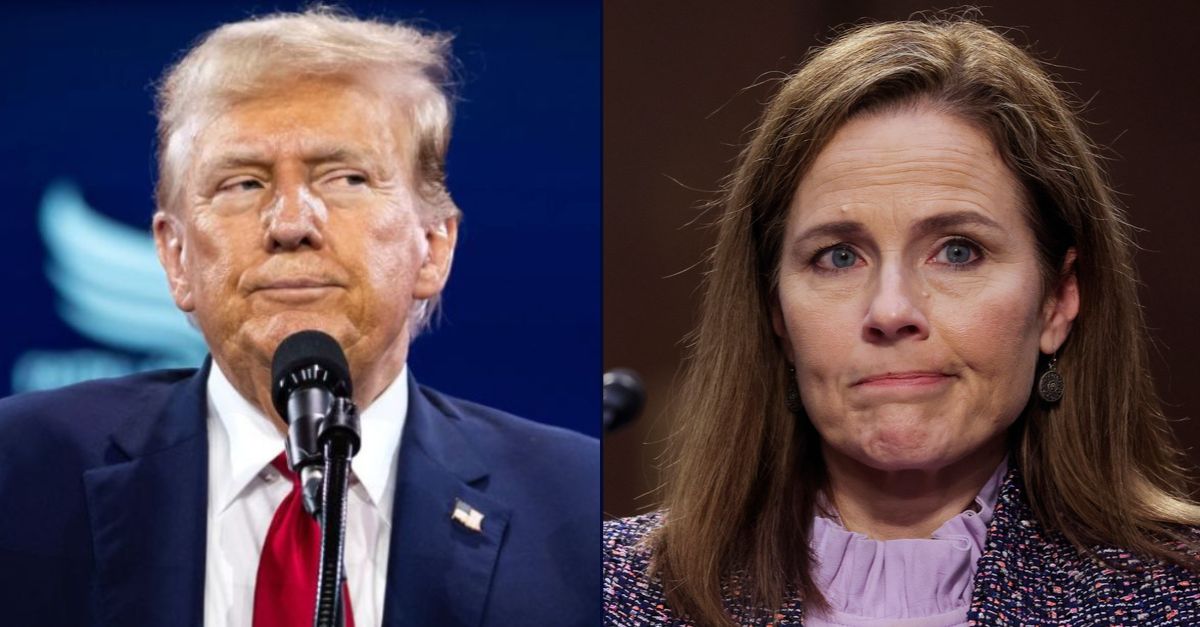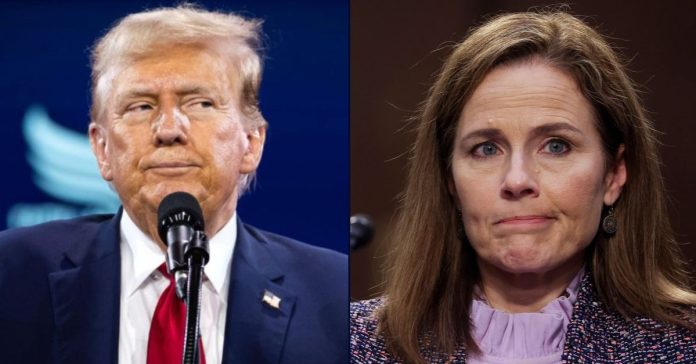
Left: Donald Trump speaks at the annual Road to Majority conference in Washington, DC, in June 2024 (Allison Bailey/NurPhoto via AP). Right: Justice Amy Coney Barrett testifies before the Senate Judiciary Committee on the third day of her confirmation hearings on Capitol Hill on October 14, 2020 in Washington, D.C., (Jonathan Ernst-Pool/Getty Images).
In a recent interview with The New York Times, U.S. Supreme Court Justice Amy Coney Barrett conceded that the high court would be incapable of enforcing its own rulings if the Trump administration openly defied orders that interfered with the president”s political agenda.
“[T]he court lacks the power of the purse,” she told columnist Ross Douthat during an interview for his podcast. “We lack the power of the sword. And so, we interpret the Constitution, we draw on precedents, we have these questions of structure, and we make the most with the tools that we have.”
The answer came after a more in-depth discussion about whether and how much the justices take the current legal landscape and political zeitgeist into account in the reasoning behind their rulings. Douthat noted that it is currently “very easy to imagine” Trump or a future president essentially telling the court, “Interesting ruling, Justice Barrett. Good luck enforcing it.”
“[J]ust as the court must take account of the consequences on the institutional dynamics, say, between a current president and a future president, the balance of power between the executive branch and the legislative branch, that of course, those same kinds of institutional concerns for the long run are ones that play a part in the court’s separation of powers decisions and always have, because they also are reflected in concerns of the constitutional structure,” Barrett said during the interview.
President Donald Trump nominated Barrett to the Supreme Court during his first term in office, just after the death of Justice Ruth Bader Ginsburg, who was widely viewed as a liberal icon. A former clerk for Justice Antonin Scalia, Barrett was the third and final of Trump’s Supreme Court nominees to be confirmed to the bench.
Love true crime? Sign up for our newsletter, The Law&Crime Docket, to get the latest real-life crime stories delivered right to your inbox.
Earlier in the discussion, Barrett reiterated that she, like Scalia, is a proponent of “originalism,” which she defined as “the proposition that the Constitution should be interpreted consistently with the meaning that the words of the Constitution had at the time that it was ratified,” adding, “where the meaning of those words can be discerned, it is decisive.”
While there are numerous interpretations of originalism, a key component of the Scalia-influenced theory espoused by Barrett is that of the “unitary executive,” meaning that the president “has to control the executive branch.”
As Barrett explained, the structural theory behind the unitary executive theory implies “strong presidential power over executive agencies.”
According to Barrett:
There has been a lot of debate and some new originalist scholarship debating right now whether indeed it has sound originalist credentials. But yes, it is one that has traditionally been associated with originalists.
You can see this in debates during the Great Depression and F.D.R. and the New Deal and the explosion of the administrative state. Back then, you had a debate about how much Congress could create administrative agencies that fell outside the president’s control.
And there were some who said: No, the executive branch has to be fully within the executive’s control. And others who favored the New Deal expansion of the administrative state who said: No, Congress can take agencies and make them independent of the president’s control.
Barrett and her five colleagues on the conservative bloc of the court are poised to take several steps toward turning this theory into reality during the court’s latest term, as the court appears likely to overturn longstanding precedents involving the president’s authority to remove members from independent federal agencies without cause as well as the authority to issue line-item vetos, which allow the president to reject particular provisions of a bill, such as refusing to spend money specifically allocated by Congress.

